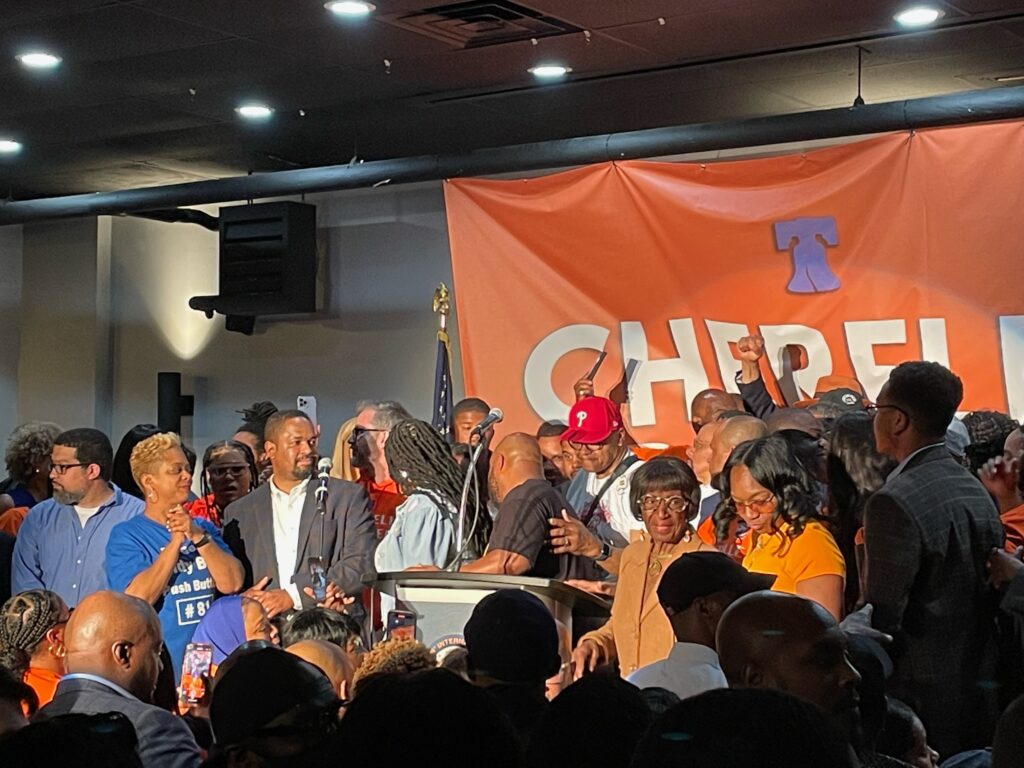Rules to win by: Union backing and the black vote propelled Cherelle Parker to victory
Philadelphia’s political wizards will tell you: Cherelle Parker had the right formula to winning Tuesday’s primary. Like a game of chess, it took planning, strategy, and knowing your opponents’ weaknesses. But like a game of poker, it took money (lots of it) and odds in your favor.
The Democratic establishment-backed Cherelle Parker won the primary with only 32 percent of the vote — or 75,914 votes. By some estimates, it was the lowest winning primary total in more than 30 years. Yet, she bested her rivals by a large margin, clinching the Democratic nomination and surprising many. This fall, she will face Republican David Oh in the general election. Given Democrats in Philadelphia outnumber Republicans more than 7 to 1, Parker is almost guaranteed the win in November.
For Parker, the recipe for winning was two-fold: high voter turnout in key neighborhoods and securing the support of Philadelphia’s labor unions leading up to the election. Early on, the city’s Northwest Coalition — a powerhouse group of black politicos — mobilized volunteers and sent the message that Parker was their pick. A protégé of longtime Philly political fixture Marian Tasco, Parker had inherited Tasco’s network of powerful Democrats, many of whom include U.S. Rep. Dwight Evans, state Sen. Vincent Hughes, state Rep. Sharif Street and others.
READ MORE — Two state senators move towards making runoff primaries a reality in Pennsylvania
“She did a nice job at the beginning to coalesce one of the most important voting blocs in the city, which is African Americans and African American women, in particular,” said Democratic political strategist Dan Fee. “She gave people a reason to vote for her.”
Fee said that Parker’s backing from the city’s building trades union gave her an extra boost by its ability to raise money, generate manpower and ultimately deliver votes.
“Ryan [Boyer] certainly did a lot of work and raised a lot of money — and then also helped set up her field program or direct voter contact program through Black Leadership PAC … He didn’t fall into the easy traps that some labor leaders fall into, which is: We have bodies, we will deploy bodies. Ryan thought: we will get money. And we will deploy bodies. They really do run a much more modern campaign than people give them credit for.”

Cherelle Parker had another advantage in that she was among a crowded field of candidates including one polarizing progressive promising so-called “solutions” to Philadelphia’s crime epidemic, which most people considered the race’s top issue. Despite her celebrity endorsements and lead in the polls, Helen Gym failed to persuade Philadelphians that her more radical ideas of putting mental health first responders on the street in place of police were what’s best for the city. This policy proposal, among other things, likely didn’t go over well particularly with people in minority communities, especially those hit hardest by gun violence.
“One thing we kept hearing time and time again is that Helen had this amazing base because she had gotten so many votes in her City Council races. And what we found was that she had a very hard base, but it wasn’t that big,” said Fee. “You couldn’t tell them anything about Helen Gym that shook their faith in her … They believe what they believe — but [the base] is smaller than people think.”
Jenny DeHuff is an accomplished writer and editor, having been a part of the Philadelphia media landscape for nearly 20 years on just about every level of journalism. From covering cops and courts to authoring Philly’s hottest gossip column, she’s learned that what she likes to write about most is politics and navigating its murky waters each election cycle. Over the span of her career, she’s won multiple awards for investigative journalism.




